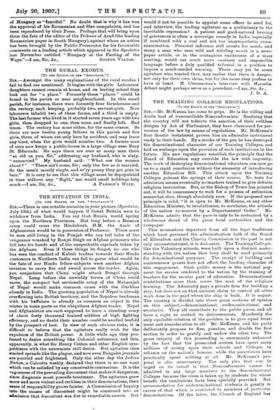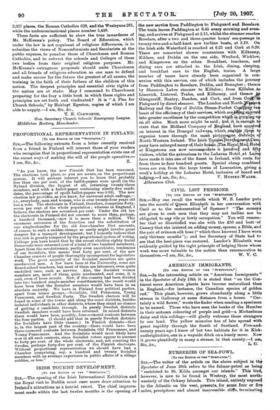THE TRAINING COLLEGE REGULATIONS. [TO THR EDITOR OF THE "31.n-wort."]
SIR,—Mr. McKenna has come to grips. He is the willing and docile tool of irreconcilable Nonconformists. Realising that the country will not tolerate the sanction of their ruthless designs by Act of Parliament, they have clamoured for per- version of the law by means of regulations. Mr. McKenna's first drastic instalment proves him an admirable instrument ready to their hands. By a stroke of the pen he has destroyed the denominational character of our Training Colleges, and laid an embargo upon the provision of such institutions in the future. His new regulations establish the principle that the Board of Education may override the law with impunity.
The work of destroying denominational education can now go on to a rapid conclusion without the necessity of introducing another Education Bill. This attack upon the Training Colleges poisons the springs at their source. No tests for admission means eventually no teachers trained to give definite religious instruction. But, as the Bishop of Truro has pointed out, it will be unnecessary to wait for a process of extinction somewhat slow, though absolutely sure. If the proposed new principle is valid, "it is open to Mr. McKenna, or any other Education Minister, to revolutionise, to secularise, the schools of the nation to-morrow by a Departmental Order." Mr. McKenna admits that the pace is only to be restrained by a wholesome dread of the great local authorities and the ratepayer.
This momentous departure from all the legal traditions which have governed the administration both of the Board of Education and the Charity Commission in the past is not only unconstitutional, it is dishonest. The Training Colleges, like the Voluntary schools, were built upon a distinct under- standing with the nation that they shall be used primarily for denominational purposes. The receipt of building and maintenance grants does not affect the binding character of this engagement. Such public money is the national pay- ment for service rendered to the nation by the training of teachers for the secular part of education. Denominational Contributions more than cover the cost of the religious training. The Admiralty pays a private firm for building a ship, but does not on that account claim to control all other work done in the yard where the ship is built. It is unjust.
The country is divided into three great sections of opinion on this subject,—denominational, undenorninational, and secularist. They all contribute to the public purse, and all have a right to control its disbursements. Manifestly the only equitable solution of the problem is to give equal treat- ment and consideration to all. Mr. McKenna and his party deliberately propose to fine, penalise, and disable the first section in order to gratify and endow the other two. The gross iniquity of this proceeding is enormously enhanced by the fact that the persecuted section have spent many millions of money upon their schools and Colleges in reliance on the nation's honour, while the persecutors have practically spent nothing at all. Mr. McKenna's pro- posal is also unnecessary. The only plea that can be urged on its behalf is that Nonconformists cannot be admitted in any large numbers to the denominational Colleges because the room is taken up by students for whose benefit the institutions have been specially provided. But accommodation for undenominational students is greatly in excess of that which is restricted to members of particular denominations. Of the latter, the Church of England has 3,337 places, the Roman Catholics 629, and the Wealeyans 281, while the undenominational places number 5,458.
These facts are sufficient to show the true inwardness of Mr. McKenna's policy. The Board of Education, which under the law is not cognisant of religious differences,: is to subsidise the views of Nonconformists and Secularists at the public expense, to penalise those of Churchmen and Roman Catholics, and to subvert the schools and Colleges of these two bodies from their original religious purposes. Mr. McKenna's outrageous proposals should unite Churchmen and all friends of religious education as one man to defend and make secure for the future the greatest of all causes, the training in the faith of their fathers of the children of this nation. The deepest principles and essential civic rights of the nation are at stake. May I commend to Churchmen preparing for the fray a little book in which these rights and principles are set forth and vindicated ? It is "A Plea for Church Schools," by Hakluyt Egerton, copies of which I am able to supply.—I am, Sir, &c., T. E. CLEWORTH,
, Hon. Secretary Church Schools' Emergency League. Miclelletcm _Rectory, Manchester.







































 Previous page
Previous page